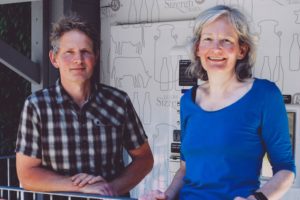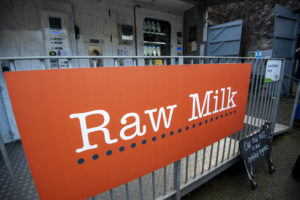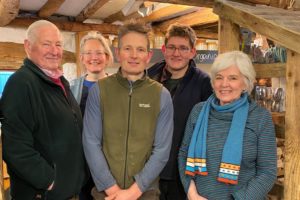Sales & Growth
Article
Business lessons from a third-generation family farm

Long-term planning and deep-rooted relationships with the local community have helped one family farm through the ups and downs of the food and farming sector.
To be a business leader today you need to be resilient. And resiliency has always been at the heart of farming. Through floods, droughts, storms, shifting trade tariffs and new regulations, farmers are good at getting things done – despite the unknown.
Since the 1980s three generations of the Park family have run Low Sizergh Barn. As tenant farmers of the National Trust, they are stewards of 341 Lake District acres with UNESCO World Heritage status.
Today the family employs more than 50 people, partners with over 40 businesses and service providers and stocks more than 80 local suppliers in the busy farm shop. Firmly rooted at the heart of their rural community, the farm has weathered countless storms and continued to grow and innovate along the way.
We spoke with Alison Park, daughter of the original founders and now heading up the farm shop, to learn some lessons on resilience and sustainable growth.
Farmers are known for their resiliency. How has your family weathered these storms over so many generations?
“Things have been hard periodically. We’re very aware all the time that we’re a rural business with a massive interdependence on other local businesses and people. It’s critical for us, and we’ve been fortunate that we do have their support. That enables us to keep growing and innovating.
“But at the same time there are also structural issues and policy issues that we have no control over which often feel like hammer blows we have to react to. But as a farming family we are well positioned to react to that. If you have a flood and lose your crop, you look to your network for help. There’s an interdependency that never stops.”
“We’re very aware all the time that we’re a rural business with a massive interdependence on other local businesses and people.”
Low Sizergh Barn has changed a lot over the years. From a simple dairy in 1980 to the busy farm shop, café, milking parlour, and vegetable garden it is today. Why did you diversify the business?
“My parents diversified from just a dairy farm largely because of new EU regulations which restricted production. The regulations had a stark effect but, being enterprising, they looked at what was possible and established the farm shop in 1991.”
How do you decide what new elements to add to your business?

“There’s just so much that’s exciting and worth pursuing out there. We think of ourselves as stewards of the land and are concerned about the loss of connection between citizens and the source of their food. So, we tend to diversify when it fits with our values.
“A window on to the milking parlour was the first step in that. Through this window people can see where their milk comes from and can take fresh produce home from the vending machine beside it. To some degree it’s also about protecting the main enterprise from the vagaries of the economy.”
Has it been challenging to implement new ideas or changes to the business?
“We’ve tried things and they’ve failed. With some things we’ve failed very fast and we know when that’s happening. As a family business we sometimes need outside advice and have worked closely with the same firm of accountants and farm business advisors who aren’t afraid to say, ‘this is how it’s looking, and these are the options’.”
“It’s quite organic and evolutionary how new ideas come about.”
How do you get your team on board with your new ideas?
“It’s really a collaboration and process of engagement with everyone that works here. It’s quite organic and evolutionary how new ideas come about. Our new pies are a good example. Everyone loves a pie, but I noticed that the ones we were selling didn’t fly the flag for local meat. So, I asked for rabbit pies from the kitchen and they sold very quickly.
“The cooks then became interested in pie recipes using local meats and started producing new ones. We don’t sit down formally and have enforced idea sessions – it’s through collaboration that they come about.”
How did that culture of employee engagement evolve?

“I think the culture is something to do with being a family business. The relationships can be very personal. My dad just had a birthday and the staff made him a cake and a card and it was a heart-warming moment.
“On the other hand, I don’t want to make it sound entirely warm and fuzzy because one of the things we’ve learned over the years is that we need to have structures in place for that culture to thrive. There are expectations attached to job roles and responsibilities, and people are made aware of our values and mission.”
“Productivity implies relentless movement forward, and if we have an attitude of interdependence then the whole is moving forward.”
What does productivity mean to you as both a farmer and a family run business?
“What I’m interested in is systems. On a farm we’re very interdependent and as a business we need to get back into that way of thinking. Productivity implies relentless movement forward, and if we have an attitude of interdependence then the whole is moving forward.
“I think it also needs to be with a long-term view. I’m often aware that multinationals and the banking sector have a very short-term view, with their shareholder reporting done quarterly. But that thinking isn’t sustainable for every business.
“Some of the techniques and innovations farmers can adopt to improve productivity and efficiency you don’t see the results for decades. Others like cross-breeding animals can reap rewards quite quickly. And that’s an interesting part of this productivity debate – the measurement and terms of reference for success. Farming life is cyclical and there’s no getting away from that. I think there are some things that all businesses can learn from farmers.
Low Sizergh Barn is nominated for best family food and drink establishment at the North West Family Business Awards. For more on the awards or to book your ticket go here.